| Reviews & Columns |
|
Reviews DVD TV on DVD Blu-ray 4K UHD International DVDs In Theaters Reviews by Studio Video Games Features Collector Series DVDs Easter Egg Database Interviews DVD Talk Radio Feature Articles Columns Anime Talk DVD Savant Horror DVDs The M.O.D. Squad Art House HD Talk Silent DVD
|
DVD Talk Forum |
|
|
| Resources |
|
DVD Price Search Customer Service #'s RCE Info Links |
|
Columns
|
|
|
Gemma Bovery
Music Box Films Home Entertainment // R // September 1, 2015
List Price: Unknown [Buy now and save at Amazon]
The Film:
Reimagining classic pieces of literature for a modern setting certainly isn't a new concept, but they're rarely as on-the-nose and self-referential as Gemma Bovery, the latest from Coco Before Chanel director Anne Fontaine. Based on the comic series from Posy Simmonds -- later published as a full graphic novel -- the story explores a surreal blend of reality and fiction in its depiction of a beautiful young woman whose name marginally differs from the protagonist of Gustave Flaubert's novel "Madame Bovary", touching on the same issues of domestic dissatisfaction and yearning for passion experienced by the book's character. As an aging baker observes and interferes with how she walks in Bovary's footsteps, her downfall into the same turmoil of Flaubert's prose take shape through the film's lukewarm, quasi-dreamlike tone and shady dependence on coincidences. What results is a vague, ponderous affair that's only salvaged by the quietly passionate and melancholy substance of Gemma Arterton's performance.
Gemma Bovery starts out on a downhearted note, depicting the burning of Gemma's possessions by her husband, Charlie (Jason Flemyng), outside their cottage in Normandy, France, affirming their relationship took a negative turn. His neighbor, Martin Joubert (Fabrice Luchini), a close acquaintance who took over duties at the local bakery over a decade prior, pilfers some of her diaries before Charlie can get around to either reading or torching them. Within, Gemma tells the story of how she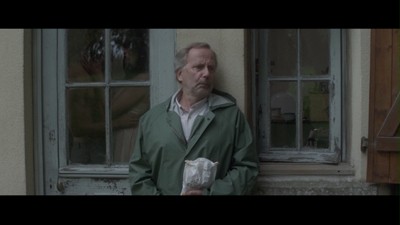 came to live in Normandy, transporting the point-of-view to the English couple's move-in date to their new French home and how an enamored Martin came to see the parallels between Gemma Bovery -- a growingly bored and dispassionate woman -- and the antiheroine of Gustave Flaubert's iconic novel, who eventually commits suicide by way of arsenic. From his bakery, through the windows of his home, even tailing her in his car, Martin tracks Gemma's changes and how she develops an affair with a young law student visiting the area to study for exams.
came to live in Normandy, transporting the point-of-view to the English couple's move-in date to their new French home and how an enamored Martin came to see the parallels between Gemma Bovery -- a growingly bored and dispassionate woman -- and the antiheroine of Gustave Flaubert's iconic novel, who eventually commits suicide by way of arsenic. From his bakery, through the windows of his home, even tailing her in his car, Martin tracks Gemma's changes and how she develops an affair with a young law student visiting the area to study for exams.
Instead of a curious neighbor with a love of Flaubert, Martin comes across as a rather creepy, obsessive, almost stalker-ish old man who can't stop himself from fawning over expatriate Gemma, which sets a peculiar tone for Gemma Bovery. Disjointed, on-the-nose scripting works around those connections to "Madame Bovary" and the awkwardness of trading info in different languages, while the loin-stirring gorgeousness of Gemma as a transformative distraction for Martin -- whether it's reality or elevated figments of his imagination -- yields a doughy, peculiarly comical approach that doesn't service the sorrowful route taken by the premise. More than that, the story is chock full of happenstance and flimsy contrivance that further muddies the wishy-washy balance between reality and fantasy, from reasons for Gemma to disrobe in front of Matin to visible hickeys, broken statues, and several soap-opera caliber "wrong place at the wrong time" connections throughout.
But, boy, is Gemma Arterton right for the part, to a degree that elevates the dissatisfaction, taboo contentment, and liberation of those blurred lines between Flaubert's character and Gemma Bovery herself. Arterton has projected an effortless blend of sensual allure and beautiful sadness in many of her previous roles, something that works wonders for the Bovary-inspired attitude she encapsulates in Gemma Bovery,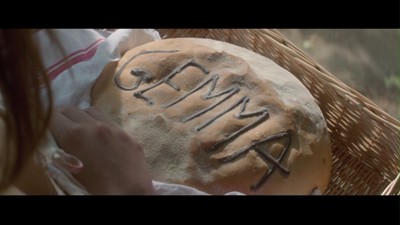 almost justifying Martin's disarmed infatuation. Her changing poise against the radiance of the Normandy countryside, especially once she indulges in the affair with her attractive law student (Niels Schneider, a softer and more endearing doppleganger of Robert Pattinson), expresses everything that the film needs to say about the effects of her low-key, secluded life -- even if their mutual chemistry leaves something to be desired. Jason Flemyng also brings the right attitude to her husband Charlie, providing an unexciting yet devoted man who does nothing to provoke his wife's promiscuity beyond being himself, allowing Gemma's complex motivations to stand on their own.
almost justifying Martin's disarmed infatuation. Her changing poise against the radiance of the Normandy countryside, especially once she indulges in the affair with her attractive law student (Niels Schneider, a softer and more endearing doppleganger of Robert Pattinson), expresses everything that the film needs to say about the effects of her low-key, secluded life -- even if their mutual chemistry leaves something to be desired. Jason Flemyng also brings the right attitude to her husband Charlie, providing an unexciting yet devoted man who does nothing to provoke his wife's promiscuity beyond being himself, allowing Gemma's complex motivations to stand on their own.
Driven by sneaky rendezvous, legal issues, and the reappearance of old flames, Gemma Bovery furthers the notion that the destiny of this forlorn woman remains inextricably linked to Flaubert's novel to the end, regardless of Martin's meddlesome attempts to prevent the same tragic outcomes. His interferences, however, do ultimately end up having an impact: coupled with a shoddy tragic ending with an overbaked dependence on circumstance, the ways in which reality deviate from the book leave the story's messages in a ruinous, unearned state among the rustic Normandy atmosphere. Director Fontaine allows Gemma Bovery to be underscored as a cautionary tale about meddling in other people's affairs and letting them pursue their own happiness, no matter how self-destructive they seem or how obvious the outcome appears. These are noble enough intentions, sure, but they ring hollow in a story so hinged on equally noble and seemingly charming intentions to the contrary, especially considering the contemporary surroundings within which Flaubert's passed-down ideas are folded into the mix.
The DVD:
Video and Audio:
Bucolic warmth and textures juxtaposed with the shadowy coolness of interior and overcast moods are what give Gemma Bovery its aesthetic flavor, presented in a fine but unremarkable 2.35:1-framed, 16x9 transfer. The sun-touched atmosphere of the French countryside allows a lot of bright light to accentuate the greens of foliage, the tans and yellows of buildings, and the subtle haze of diffused lighting reaching interiors. Conversely, the shadows and quasi-depressive lack of saturation in indoor shots are capable represented by stable contrast and delicate blues and tans. Baked bread, woven hats, tendrils of hair, and the weathered walls of the Bovery household lure pleasing fine textures out of the cinematography, while skin tones are appropriately warm or pinkish depending on the light source. The image does seem somewhat dim at times, yet that doesn't stop certain black levels from appearing too light, and general sharpness wavers in many shots. All quite palatable, though.
Complexity isn't really on the menu for this 5.1 Dolby Digital track for Gemma Bovery, sporting only a few sparse effects within its indie-drama sound design, one that's far more concerned with dialogue stability and subtle ambience. Narration is persistent throughout the film, which commands a robust middle-range tenor without any distortion and a moderate amount of lower-frequency response. Similarly, musical elements are just as clear and adjusted to silence in the background, responsible for the bulk of the track's surround design as instruments and vocals -- including a few poppy tunes -- keep up a clear and vibrant presence. Other sound elements are reduced to little things like the echoes of an old house, the motion of driving cars, and buzzing bugs, which are well-attuned and clear. The English subtitles are expertly translated and coherent.
Special Features:
Music Box Films have included a nice arrangement of extras for Gemma Bovery, led by In the Footsteps of Emma: The Making of Gemma Bovery (21:24, 16x9), a traditional interview and behind-the-scenes featurette with a nice twist. Director Anne Fontaine and Gemma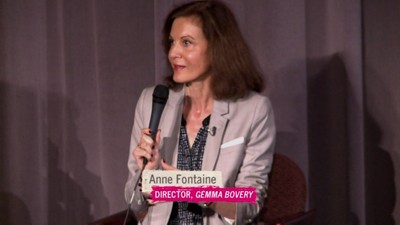 Arterton lead the way in their recollection of getting the film up and running, enlightening on why Fontaine's films appeal to women, Arterton's prior experience with the French language, and how crucial Fabrice Luchini's character interlocks with the narrative. Later, some page-to-screen comparisons and behind-the-scenes footage also emerge organically in their chats, which are mostly in French with English subtitles (the English bits have French subs). Master Class with Anne Fontaine (22:1, 16x9) is, actually, a pretty apt description of the feature, transforming a moderated Q&A format into a fine commentary about the director's composition, inspiration, working with accents and retaining a specific mood.
Arterton lead the way in their recollection of getting the film up and running, enlightening on why Fontaine's films appeal to women, Arterton's prior experience with the French language, and how crucial Fabrice Luchini's character interlocks with the narrative. Later, some page-to-screen comparisons and behind-the-scenes footage also emerge organically in their chats, which are mostly in French with English subtitles (the English bits have French subs). Master Class with Anne Fontaine (22:1, 16x9) is, actually, a pretty apt description of the feature, transforming a moderated Q&A format into a fine commentary about the director's composition, inspiration, working with accents and retaining a specific mood.
Also included is a brief arrangement of comparisons between the hand-drawn artwork from the graphic novel and the scenes from the film, entitled From Page to Screen (3:01, 16x9), as well as an explicit Graphic Novel Gallery featuring 32 slides of artwork from the publication. Finally, a Theatrical Trailer (1:46, 16x9) has been included.
Final Thoughts:
Despite a radiant, gloomily sultry Gemma Arterton and a decidedly creative reinterpretation of Gustave Flaubert's famous novel in the French countryside, Anne Fontaine misses the mark with Gemma Bovery's quixotic blend of romantic comedy and tragic drama. Part of the problem lies in the literal and harped-upon duplication of the book's plot developments, cutely disguised with a sentiment of life imitating art, but it also has to do with the overly obsessive tenor of her aging admirer Martin and the prevalence of rickety contrivances forcing things to happen in the story. The result, after a dubiously downhearted ending, is a heavy emotional backdrop for Arterton's talents that drops the loaf where it really counts. Rent It.
Thomas Spurlin, Staff Reviewer -- DVDTalk Reviews | Personal Blog/Site
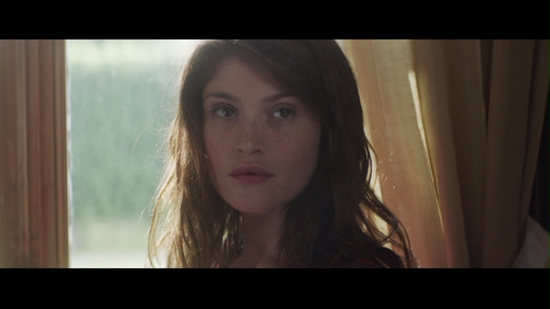 |
Reimagining classic pieces of literature for a modern setting certainly isn't a new concept, but they're rarely as on-the-nose and self-referential as Gemma Bovery, the latest from Coco Before Chanel director Anne Fontaine. Based on the comic series from Posy Simmonds -- later published as a full graphic novel -- the story explores a surreal blend of reality and fiction in its depiction of a beautiful young woman whose name marginally differs from the protagonist of Gustave Flaubert's novel "Madame Bovary", touching on the same issues of domestic dissatisfaction and yearning for passion experienced by the book's character. As an aging baker observes and interferes with how she walks in Bovary's footsteps, her downfall into the same turmoil of Flaubert's prose take shape through the film's lukewarm, quasi-dreamlike tone and shady dependence on coincidences. What results is a vague, ponderous affair that's only salvaged by the quietly passionate and melancholy substance of Gemma Arterton's performance.
Gemma Bovery starts out on a downhearted note, depicting the burning of Gemma's possessions by her husband, Charlie (Jason Flemyng), outside their cottage in Normandy, France, affirming their relationship took a negative turn. His neighbor, Martin Joubert (Fabrice Luchini), a close acquaintance who took over duties at the local bakery over a decade prior, pilfers some of her diaries before Charlie can get around to either reading or torching them. Within, Gemma tells the story of how she
 came to live in Normandy, transporting the point-of-view to the English couple's move-in date to their new French home and how an enamored Martin came to see the parallels between Gemma Bovery -- a growingly bored and dispassionate woman -- and the antiheroine of Gustave Flaubert's iconic novel, who eventually commits suicide by way of arsenic. From his bakery, through the windows of his home, even tailing her in his car, Martin tracks Gemma's changes and how she develops an affair with a young law student visiting the area to study for exams.
came to live in Normandy, transporting the point-of-view to the English couple's move-in date to their new French home and how an enamored Martin came to see the parallels between Gemma Bovery -- a growingly bored and dispassionate woman -- and the antiheroine of Gustave Flaubert's iconic novel, who eventually commits suicide by way of arsenic. From his bakery, through the windows of his home, even tailing her in his car, Martin tracks Gemma's changes and how she develops an affair with a young law student visiting the area to study for exams. Instead of a curious neighbor with a love of Flaubert, Martin comes across as a rather creepy, obsessive, almost stalker-ish old man who can't stop himself from fawning over expatriate Gemma, which sets a peculiar tone for Gemma Bovery. Disjointed, on-the-nose scripting works around those connections to "Madame Bovary" and the awkwardness of trading info in different languages, while the loin-stirring gorgeousness of Gemma as a transformative distraction for Martin -- whether it's reality or elevated figments of his imagination -- yields a doughy, peculiarly comical approach that doesn't service the sorrowful route taken by the premise. More than that, the story is chock full of happenstance and flimsy contrivance that further muddies the wishy-washy balance between reality and fantasy, from reasons for Gemma to disrobe in front of Matin to visible hickeys, broken statues, and several soap-opera caliber "wrong place at the wrong time" connections throughout.
But, boy, is Gemma Arterton right for the part, to a degree that elevates the dissatisfaction, taboo contentment, and liberation of those blurred lines between Flaubert's character and Gemma Bovery herself. Arterton has projected an effortless blend of sensual allure and beautiful sadness in many of her previous roles, something that works wonders for the Bovary-inspired attitude she encapsulates in Gemma Bovery,
 almost justifying Martin's disarmed infatuation. Her changing poise against the radiance of the Normandy countryside, especially once she indulges in the affair with her attractive law student (Niels Schneider, a softer and more endearing doppleganger of Robert Pattinson), expresses everything that the film needs to say about the effects of her low-key, secluded life -- even if their mutual chemistry leaves something to be desired. Jason Flemyng also brings the right attitude to her husband Charlie, providing an unexciting yet devoted man who does nothing to provoke his wife's promiscuity beyond being himself, allowing Gemma's complex motivations to stand on their own.
almost justifying Martin's disarmed infatuation. Her changing poise against the radiance of the Normandy countryside, especially once she indulges in the affair with her attractive law student (Niels Schneider, a softer and more endearing doppleganger of Robert Pattinson), expresses everything that the film needs to say about the effects of her low-key, secluded life -- even if their mutual chemistry leaves something to be desired. Jason Flemyng also brings the right attitude to her husband Charlie, providing an unexciting yet devoted man who does nothing to provoke his wife's promiscuity beyond being himself, allowing Gemma's complex motivations to stand on their own. Driven by sneaky rendezvous, legal issues, and the reappearance of old flames, Gemma Bovery furthers the notion that the destiny of this forlorn woman remains inextricably linked to Flaubert's novel to the end, regardless of Martin's meddlesome attempts to prevent the same tragic outcomes. His interferences, however, do ultimately end up having an impact: coupled with a shoddy tragic ending with an overbaked dependence on circumstance, the ways in which reality deviate from the book leave the story's messages in a ruinous, unearned state among the rustic Normandy atmosphere. Director Fontaine allows Gemma Bovery to be underscored as a cautionary tale about meddling in other people's affairs and letting them pursue their own happiness, no matter how self-destructive they seem or how obvious the outcome appears. These are noble enough intentions, sure, but they ring hollow in a story so hinged on equally noble and seemingly charming intentions to the contrary, especially considering the contemporary surroundings within which Flaubert's passed-down ideas are folded into the mix.
The DVD:
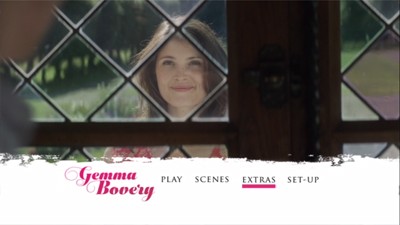 | 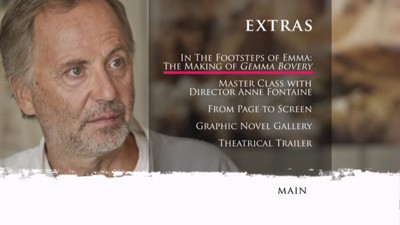 |
Video and Audio:
Bucolic warmth and textures juxtaposed with the shadowy coolness of interior and overcast moods are what give Gemma Bovery its aesthetic flavor, presented in a fine but unremarkable 2.35:1-framed, 16x9 transfer. The sun-touched atmosphere of the French countryside allows a lot of bright light to accentuate the greens of foliage, the tans and yellows of buildings, and the subtle haze of diffused lighting reaching interiors. Conversely, the shadows and quasi-depressive lack of saturation in indoor shots are capable represented by stable contrast and delicate blues and tans. Baked bread, woven hats, tendrils of hair, and the weathered walls of the Bovery household lure pleasing fine textures out of the cinematography, while skin tones are appropriately warm or pinkish depending on the light source. The image does seem somewhat dim at times, yet that doesn't stop certain black levels from appearing too light, and general sharpness wavers in many shots. All quite palatable, though.
Complexity isn't really on the menu for this 5.1 Dolby Digital track for Gemma Bovery, sporting only a few sparse effects within its indie-drama sound design, one that's far more concerned with dialogue stability and subtle ambience. Narration is persistent throughout the film, which commands a robust middle-range tenor without any distortion and a moderate amount of lower-frequency response. Similarly, musical elements are just as clear and adjusted to silence in the background, responsible for the bulk of the track's surround design as instruments and vocals -- including a few poppy tunes -- keep up a clear and vibrant presence. Other sound elements are reduced to little things like the echoes of an old house, the motion of driving cars, and buzzing bugs, which are well-attuned and clear. The English subtitles are expertly translated and coherent.
Special Features:
Music Box Films have included a nice arrangement of extras for Gemma Bovery, led by In the Footsteps of Emma: The Making of Gemma Bovery (21:24, 16x9), a traditional interview and behind-the-scenes featurette with a nice twist. Director Anne Fontaine and Gemma
 Arterton lead the way in their recollection of getting the film up and running, enlightening on why Fontaine's films appeal to women, Arterton's prior experience with the French language, and how crucial Fabrice Luchini's character interlocks with the narrative. Later, some page-to-screen comparisons and behind-the-scenes footage also emerge organically in their chats, which are mostly in French with English subtitles (the English bits have French subs). Master Class with Anne Fontaine (22:1, 16x9) is, actually, a pretty apt description of the feature, transforming a moderated Q&A format into a fine commentary about the director's composition, inspiration, working with accents and retaining a specific mood.
Arterton lead the way in their recollection of getting the film up and running, enlightening on why Fontaine's films appeal to women, Arterton's prior experience with the French language, and how crucial Fabrice Luchini's character interlocks with the narrative. Later, some page-to-screen comparisons and behind-the-scenes footage also emerge organically in their chats, which are mostly in French with English subtitles (the English bits have French subs). Master Class with Anne Fontaine (22:1, 16x9) is, actually, a pretty apt description of the feature, transforming a moderated Q&A format into a fine commentary about the director's composition, inspiration, working with accents and retaining a specific mood. Also included is a brief arrangement of comparisons between the hand-drawn artwork from the graphic novel and the scenes from the film, entitled From Page to Screen (3:01, 16x9), as well as an explicit Graphic Novel Gallery featuring 32 slides of artwork from the publication. Finally, a Theatrical Trailer (1:46, 16x9) has been included.
Final Thoughts:
Despite a radiant, gloomily sultry Gemma Arterton and a decidedly creative reinterpretation of Gustave Flaubert's famous novel in the French countryside, Anne Fontaine misses the mark with Gemma Bovery's quixotic blend of romantic comedy and tragic drama. Part of the problem lies in the literal and harped-upon duplication of the book's plot developments, cutely disguised with a sentiment of life imitating art, but it also has to do with the overly obsessive tenor of her aging admirer Martin and the prevalence of rickety contrivances forcing things to happen in the story. The result, after a dubiously downhearted ending, is a heavy emotional backdrop for Arterton's talents that drops the loaf where it really counts. Rent It.
|
| Popular Reviews |
| Sponsored Links |
|
|
| Sponsored Links |
|
|
| Release List | Reviews | Shop | Newsletter | Forum | DVD Giveaways | Blu-Ray | Advertise |
|
Copyright 2024 DVDTalk.com All Rights Reserved. Legal Info, Privacy Policy, Terms of Use,
Manage Preferences,
Your Privacy Choices | |||||||














